10 Best Non-fiction books According to Daniel
You can send us your collection by going to ContactUs page.
Please be aware that the content within this list may be updated, modified, or revised in the future. As new information becomes available or circumstances evolve, the items or rankings within the list may be adjusted accordingly.
Note that the collection presented here has been contributed by an individual and every Individual has its own Opinion so it is not an official collection. While we strive to curate and provide high-quality content, the accuracy, completeness, and authenticity of the collection cannot be guaranteed. The views, opinions, and selection of items within this collection solely belong to the user who created it. We encourage you to explore and enjoy the collection with an open mind, understanding that it reflects personal preferences and perspectives. Should you have any questions or concerns, please feel free to reach out to us. Your feedback is valuable as we continuously strive to enhance your browsing experience
Created By: Daniel
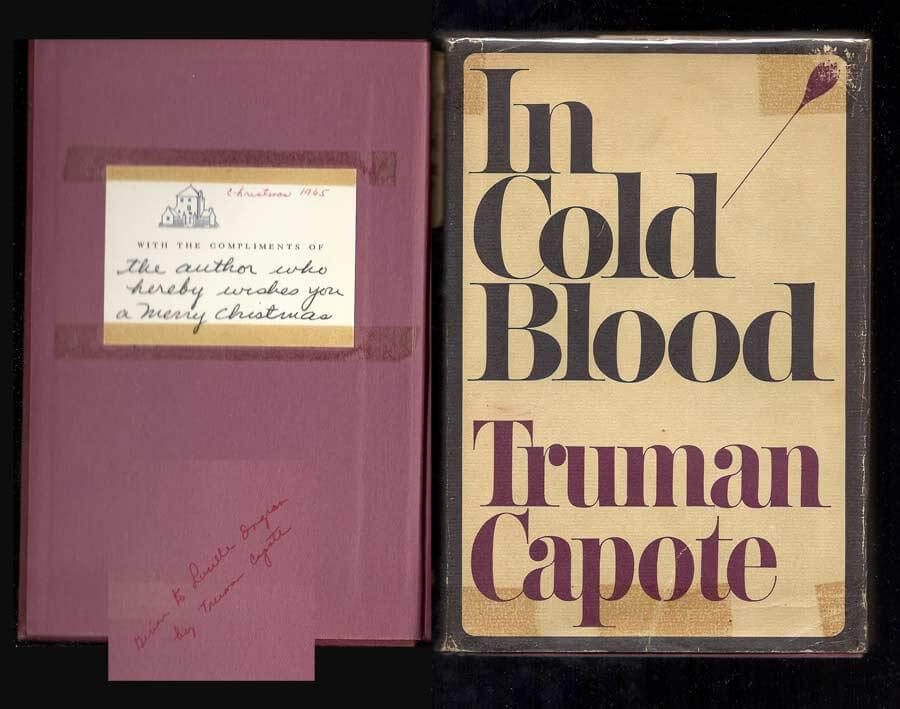
Title: In Cold Blood
Author: Truman Capote
Year of Publication: 1965
Genre: True Crime, Non-fiction Novel
Setting: Holcomb, Kansas, United States, and various other locations during the 1950s
Plot: "In Cold Blood" is a groundbreaking work of true crime literature that tells the chilling and true story of the brutal murder of the Clutter family in their rural Kansas home. Truman Capote meticulously researched the case, conducting interviews and gathering information over a period of several years. The book follows the lives of the victims, the investigation into the crime, the capture and trial of the killers, and the impact the tragedy had on the community. Capote delves into the psychology and motives of the perpetrators, exploring themes of violence, morality, and the nature of evil.
Major Characters:
- Herb Clutter: The patriarch of the Clutter family, a well-respected and successful farmer.
- Bonnie Clutter: Herb's wife and mother to their four children.
- Perry Smith: One of the convicted killers, who forms a complex relationship with the author.
- Richard "Dick" Hickock: The other convicted killer and Perry's accomplice.
Awards: "In Cold Blood" is widely regarded as a masterpiece of true crime literature and received critical acclaim. While it did not receive any major literary awards, the book remains highly influential and is considered a landmark in the true crime genre.
Legacy: Truman Capote's "In Cold Blood" revolutionized the genre of true crime writing. The book introduced a narrative style that combined factual reporting with the techniques of fiction storytelling, blurring the boundaries between journalism and literature. Capote's in-depth exploration of the psychology of the killers and his examination of the societal impact of the crime set a new standard for true crime narratives. "In Cold Blood" continues to be studied and analyzed for its unique blend of fact and storytelling, and it remains a significant and enduring work in the realm of true crime literature.
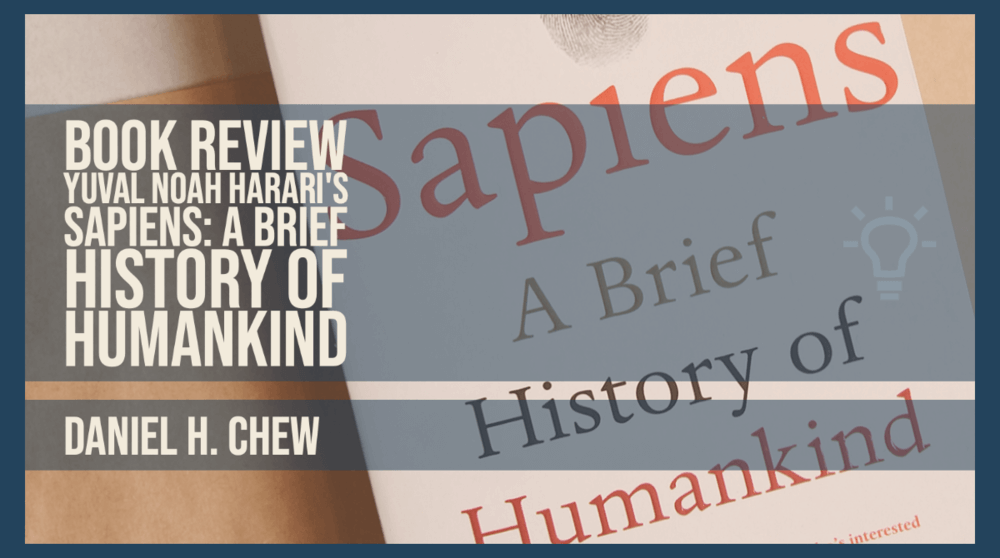
Title: Sapiens: A Brief History of Humankind
Author: Yuval Noah Harari
Year of Publication: 2011
Genre: Non-fiction, History, Anthropology
Setting: Primarily Earth, covering the entire span of human history
Summary: "Sapiens: A Brief History of Humankind" is a thought-provoking and sweeping account of human history that explores the development and impact of Homo sapiens, the species to which we belong. The book traces the journey of humankind from the emergence of our species in Africa to the present day, covering key milestones, revolutions, and shifts that shaped human society and culture. It examines critical aspects of human evolution, such as the Cognitive Revolution, the Agricultural Revolution, the emergence of empires, the Scientific Revolution, and the challenges and implications of our modern world. Throughout the book, Harari raises profound questions about the nature of human existence, our collective beliefs, and the future direction of our species.
Major Themes:
- Human Evolution: The book delves into the biological and cultural evolution of Homo sapiens, exploring how our species emerged, expanded, and eventually became the dominant force on Earth.
- Cognitive Revolution: Harari explores the cognitive abilities and unique traits that set humans apart from other animals, such as language, storytelling, and the formation of shared beliefs.
- Agricultural Revolution: The shift from hunter-gatherer societies to settled agricultural communities is examined, along with its consequences for human society, inequality, and the environment.
- Impact of Technology: Harari investigates the impact of technological advancements, such as the invention of writing, the Industrial Revolution, and the rise of artificial intelligence, on human societies.
Awards: "Sapiens: A Brief History of Humankind" received widespread acclaim and has been translated into numerous languages. While it did not receive any major literary awards, the book has gained immense popularity and has been highly influential in the fields of history, anthropology, and popular science.
Legacy: "Sapiens" has garnered a large and devoted readership, appealing to both academic and general audiences. Its thought-provoking insights and broad exploration of human history have sparked discussions and debates about the nature of humanity, our impact on the planet, and the future of our species. The book has been praised for its accessible writing style, its ability to distill complex ideas into understandable terms, and its ability to challenge commonly held assumptions about human history.
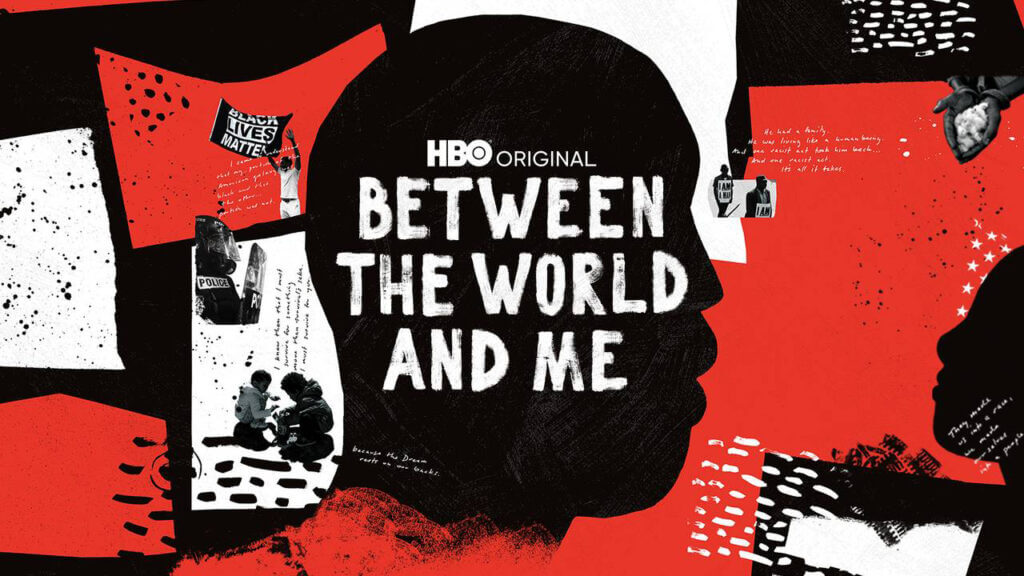
Title: Between the World and Me
Author: Ta-Nehisi Coates
Year of Publication: 2015
Genre: Memoir, Non-fiction
Setting: Primarily in the United States, with a focus on the experiences of Black individuals and communities
Summary: "Between the World and Me" is a powerful and introspective memoir written as a letter from Ta-Nehisi Coates to his teenage son. The book addresses themes of race, identity, and the ongoing struggle for racial justice in America. Coates reflects on his personal experiences growing up in Baltimore and his journey of understanding the realities of being Black in a society marked by systemic racism and violence. He explores the historical and contemporary context of racial oppression, drawing from personal anecdotes, historical events, and literary references to convey the challenges, fears, and hopes that shape the Black experience in America.
Major Themes:
- Racial Identity: Coates explores how race shapes personal identity and the experiences of Black individuals in America.
- Systemic Racism: The book delves into the historical and ongoing structures of systemic racism and how they perpetuate inequality and injustice.
- Black Bodies and Violence: Coates examines the violence inflicted on Black bodies, both at the hands of individuals and through institutionalized mechanisms.
- Fatherhood and Legacy: The author reflects on his role as a father and the responsibility of passing down wisdom, resilience, and self-love to his son.
Awards: "Between the World and Me" received widespread critical acclaim and numerous awards, including:
- National Book Award for Nonfiction (2015)
- Kirkus Prize for Nonfiction (2015)
- NAACP Image Award for Outstanding Literary Work – Nonfiction (2016)
Legacy: Coates's book has been widely praised for its raw and evocative portrayal of the Black experience in America. It has sparked important conversations about race, racism, and the urgent need for societal change. "Between the World and Me" is considered a contemporary classic and continues to resonate with readers, educators, and activists as a poignant and illuminating work that invites reflection, empathy, and a deeper understanding of the Black American experience.
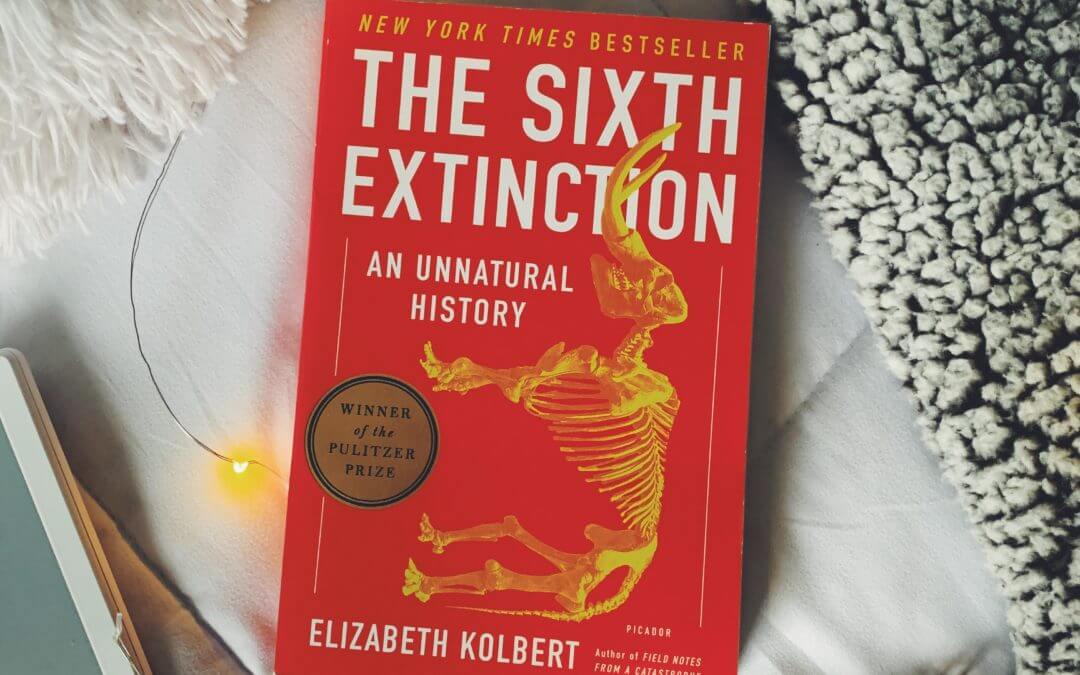
Title: The Sixth Extinction: An Unnatural History
Author: Elizabeth Kolbert
Year of Publication: 2014
Genre: Non-fiction, Science, Environmentalism
Setting: Global, with a focus on various ecosystems and species impacted by human activities
Summary: "The Sixth Extinction: An Unnatural History" is a compelling and thought-provoking work that explores the ongoing mass extinction of species on Earth and its causes. Elizabeth Kolbert examines the alarming rate at which species are disappearing and the role of human activities, such as habitat destruction, climate change, pollution, and the introduction of non-native species, in driving these extinctions. Drawing on scientific research, fieldwork, and interviews with experts, Kolbert presents a comprehensive and sobering analysis of the current biodiversity crisis. The book highlights the importance of biodiversity and raises urgent questions about our responsibility to protect and preserve the natural world.
Major Themes:
- Mass Extinction Events: Kolbert discusses the history of mass extinctions throughout Earth's history, exploring how the current extinction event compares to previous ones and the unique role humans play in causing it.
- Human Impact on the Environment: The book examines the ways in which human activities, particularly those related to industrialization and climate change, have dramatically altered ecosystems and contributed to the loss of biodiversity.
- Species and Ecosystems at Risk: Kolbert focuses on specific examples of species and ecosystems that are particularly vulnerable to extinction, shedding light on their ecological importance and the challenges they face.
- Environmental Conservation: "The Sixth Extinction" emphasizes the urgency of environmental conservation and the need for collective action to address the current crisis.
Awards: "The Sixth Extinction: An Unnatural History" received widespread acclaim and several awards, including:
- Pulitzer Prize for General Nonfiction (2015)
- PEN/E.O. Wilson Literary Science Writing Award (2015)
Legacy: Kolbert's book has been highly influential in raising awareness about the ongoing biodiversity crisis and the human role in causing it. It has sparked conversations and debates about the need for environmental stewardship and the consequences of unchecked human activity on the natural world. "The Sixth Extinction" serves as a call to action, urging individuals, policymakers, and society as a whole to prioritize the preservation of biodiversity and take steps to mitigate the factors contributing to species loss. The book continues to be regarded as an important contribution to the field of environmental science and a catalyst for environmental advocacy.
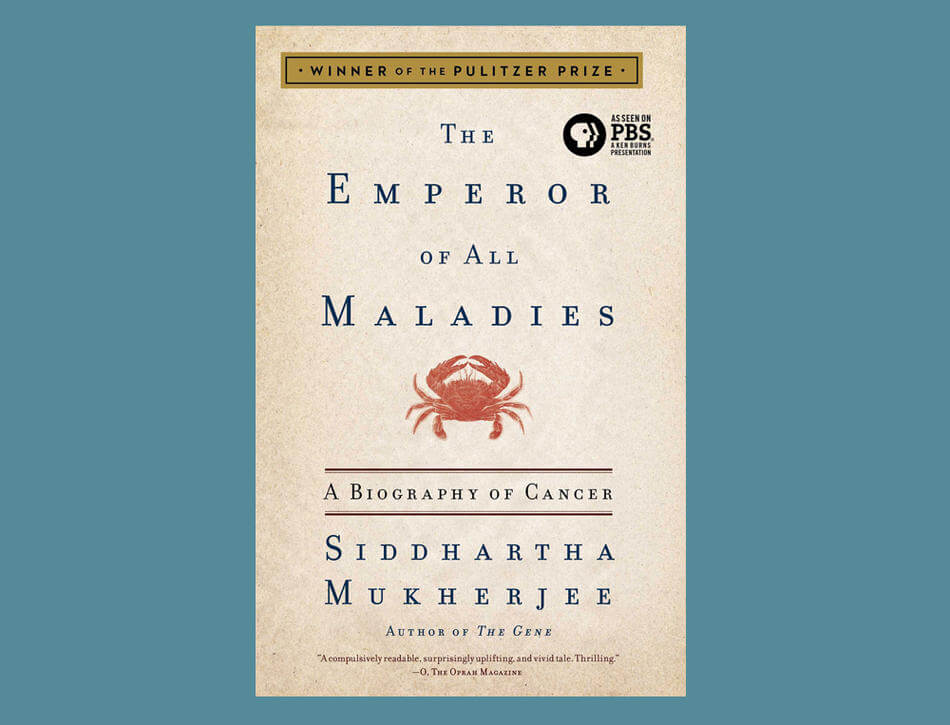
Title: The Emperor of All Maladies: A Biography of Cancer
Author: Siddhartha Mukherjee
Year of Publication: 2010
Genre: Non-fiction, Medical, History
Setting: Primarily in the United States, with a global perspective on cancer research and treatment
Summary: "The Emperor of All Maladies" is a comprehensive and acclaimed work that provides a detailed account of the history, science, and societal impact of cancer. Siddhartha Mukherjee, an oncologist and researcher, weaves together scientific discoveries, medical breakthroughs, and personal stories to create a captivating narrative about one of the most prevalent and complex diseases affecting humanity. The book covers the early origins of cancer, the evolution of cancer research and treatment, and the ongoing efforts to understand and combat this formidable disease. It explores the multifaceted nature of cancer, its impact on individuals and society, and the progress made in diagnosing, treating, and preventing various forms of cancer.
Major Themes:
- History of Cancer: The book delves into the historical understanding of cancer, tracing its origins and the evolving perception of the disease throughout different time periods.
- Scientific Advances: Mukherjee explores the scientific breakthroughs, medical discoveries, and technological advancements that have revolutionized our understanding of cancer and its treatment.
- Impact on Individuals and Society: The book examines the personal stories of patients, caregivers, and medical professionals affected by cancer, as well as the societal implications of the disease.
- Challenges and Future Directions: Mukherjee highlights the ongoing challenges in cancer research and treatment, as well as the promising developments and future directions in the fight against cancer.
Awards: "The Emperor of All Maladies" received widespread acclaim and several awards, including:
- Pulitzer Prize for General Nonfiction (2011)
- National Book Critics Circle Award for General Nonfiction (2010)
Legacy: The book's profound and comprehensive exploration of cancer has had a significant impact on public awareness and understanding of the disease. It has been praised for its blend of scientific rigor, historical context, and human narrative. "The Emperor of All Maladies" has contributed to broader discussions about cancer research, treatment, and prevention, and has inspired individuals in the medical field and beyond to continue the fight against cancer. The book remains highly regarded for its engaging storytelling and its informative and compassionate approach to a topic that affects millions of lives
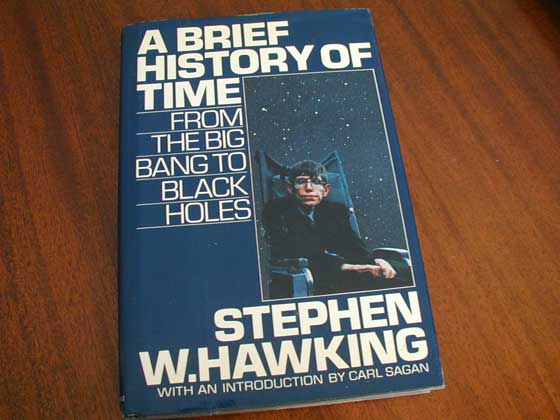
Title: A Brief History of Time
Author: Stephen Hawking
Year of Publication: 1988
Genre: Non-fiction, Science, Cosmology
Setting: The universe, from its origins to the present day
Summary: "A Brief History of Time" is a landmark book that presents complex scientific concepts and theories in a way that is accessible to the general reader. Written by renowned theoretical physicist Stephen Hawking, the book explores the fundamental questions of the universe, including its origins, the nature of time, the Big Bang theory, black holes, and the possibilities of time travel. Hawking guides readers through the history of scientific thought and the evolution of our understanding of the cosmos. The book combines scientific explanations with engaging analogies and anecdotes to shed light on some of the most profound questions about the nature of existence and our place in the universe.
Major Themes:
- Cosmology and the Universe: Hawking provides an overview of the history and current understanding of the universe, its expansion, and the nature of time.
- Black Holes: The book explores the concept of black holes, their formation, properties, and their role in the universe.
- The Big Bang: Hawking discusses the prevailing theory of the universe's origin, known as the Big Bang, and its implications for our understanding of space and time.
- Time and the Arrow of Time: The nature of time and its relationship to the laws of physics are explored, including the concept of the arrow of time and the potential for time travel.
Awards: "A Brief History of Time" achieved significant commercial success and critical acclaim. While it did not receive any major literary awards, the book has sold millions of copies worldwide and has been highly influential in popularizing scientific concepts.
Legacy: Hawking's book has had a profound impact on popular science and has captivated readers with its exploration of the mysteries of the universe. "A Brief History of Time" helped to make complex scientific ideas accessible to a wide audience and sparked widespread interest in cosmology and theoretical physics. The book remains an iconic work in the field of popular science literature, and its impact continues to inspire scientific curiosity and a deeper understanding of the universe.
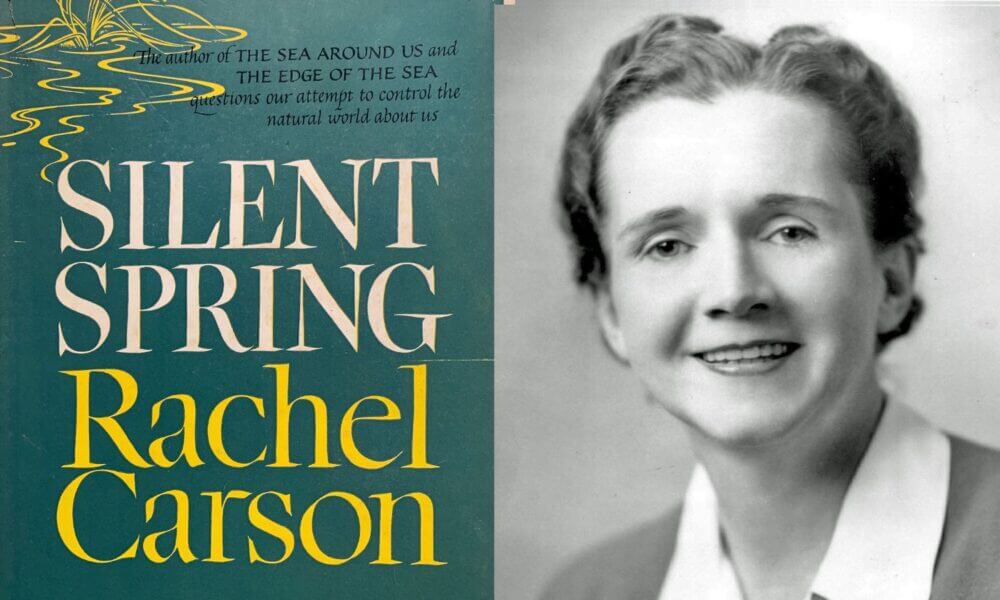
Title: Silent Spring
Author: Rachel Carson
Year of Publication: 1962
Genre: Non-fiction, Environmentalism
Setting: United States and various locations impacted by pesticide use
Summary: "Silent Spring" is a groundbreaking and influential book that exposed the environmental and health hazards associated with the widespread use of pesticides, particularly DDT (dichloro-diphenyl-trichloroethane), in the United States. Rachel Carson, a marine biologist and conservationist, meticulously researched and documented the detrimental effects of pesticides on ecosystems, wildlife, and human health. The book raises concerns about the indiscriminate use of chemicals, their persistence in the environment, and the long-term consequences of pesticide exposure. "Silent Spring" ignited a nationwide debate and led to significant changes in environmental policy, ultimately spurring the modern environmental movement.
Major Themes:
- Environmental Pollution: Carson highlights the detrimental effects of pesticides on the environment, particularly on birds, insects, and other wildlife, and the subsequent disruption of ecosystems.
- Human Health Impacts: The book explores the potential health risks associated with pesticide exposure, drawing attention to the links between chemical use and diseases, such as cancer and reproductive issues.
- Ecological Balance: Carson emphasizes the importance of maintaining a balanced and healthy environment, urging readers to consider the interconnectedness of species and ecosystems.
Awards: While "Silent Spring" did not receive any major literary awards, its impact and significance in the field of environmentalism have been widely recognized. Rachel Carson posthumously received the Presidential Medal of Freedom in 1980 for her contributions to environmental conservation.
Legacy: "Silent Spring" is often credited with sparking the modern environmental movement and has been instrumental in raising public awareness about the detrimental effects of pesticides and the importance of environmental conservation. The book led to increased regulation of pesticides in the United States, including the banning of DDT for agricultural use. Carson's work inspired generations of environmental activists and influenced the development of environmental policy and advocacy. "Silent Spring" remains a seminal work that highlights the need for responsible and sustainable approaches to protecting the environment and ensuring human and ecological well-being.
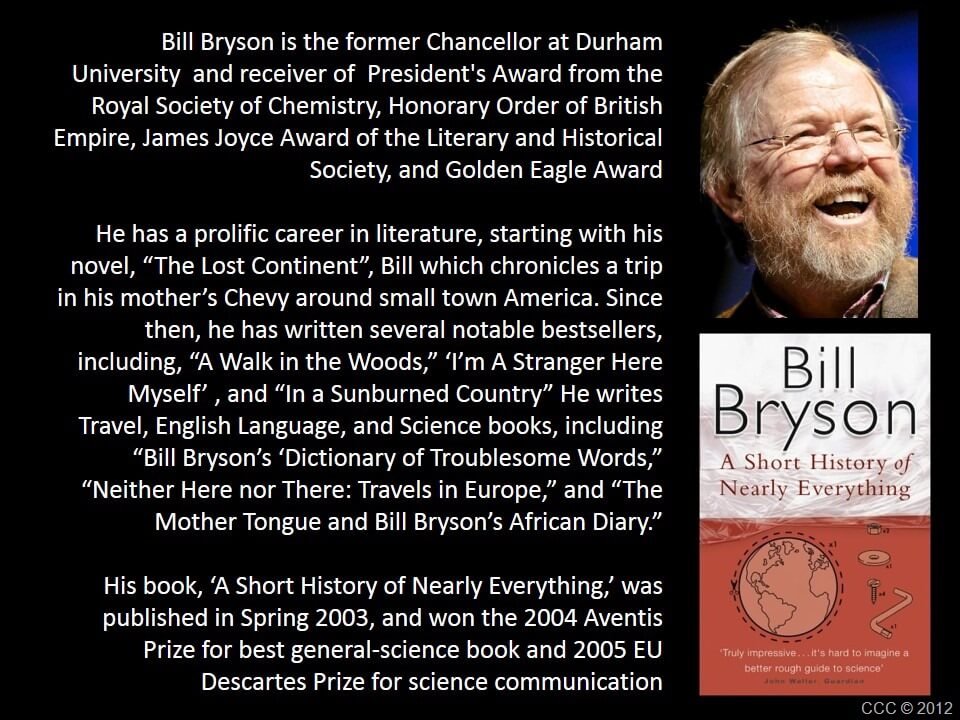
Title: A Short History of Nearly Everything
Author: Bill Bryson
Year of Publication: 2003
Genre: Non-fiction, Science, Popular Science
Setting: Earth and the universe, covering a wide range of scientific disciplines and their historical development
Summary: "A Short History of Nearly Everything" is a captivating and accessible exploration of the history of science, covering a wide array of topics ranging from cosmology and geology to biology and anthropology. Bill Bryson takes readers on a journey through time and space, discussing the major scientific discoveries, breakthroughs, and theories that have shaped our understanding of the natural world. The book combines scientific explanations with engaging storytelling and humor, making complex scientific concepts and discoveries accessible to a general audience. Bryson explores the challenges faced by scientists, the quirks of scientific history, and the wonders of the natural world.
Major Themes:
- Origins of the Universe and Earth: The book explores theories about the origins of the universe, the formation of our solar system, and the development of Earth.
- Geology and Paleontology: Bryson delves into the study of rocks, minerals, fossils, and the history of the Earth's geological changes.
- Biology and Evolution: The book discusses the principles of biology, the diversity of life on Earth, and the mechanisms of evolution.
- Scientific Discoveries and Personalities: Bryson profiles notable scientists throughout history and highlights their contributions to various fields of science.
Awards: "A Short History of Nearly Everything" received widespread acclaim and several awards, including:
- Aventis Prize for General Science Book (2004)
- Descartes Science Communication Prize (2005)
Legacy: The book has been highly influential in popularizing science and generating interest in scientific exploration and discovery. It has been praised for its ability to present complex scientific concepts in an engaging and understandable manner. "A Short History of Nearly Everything" has inspired readers of all backgrounds to appreciate the wonders of the natural world and the remarkable achievements of human curiosity and scientific inquiry. It remains a beloved and popular work in the realm of popular science literature.
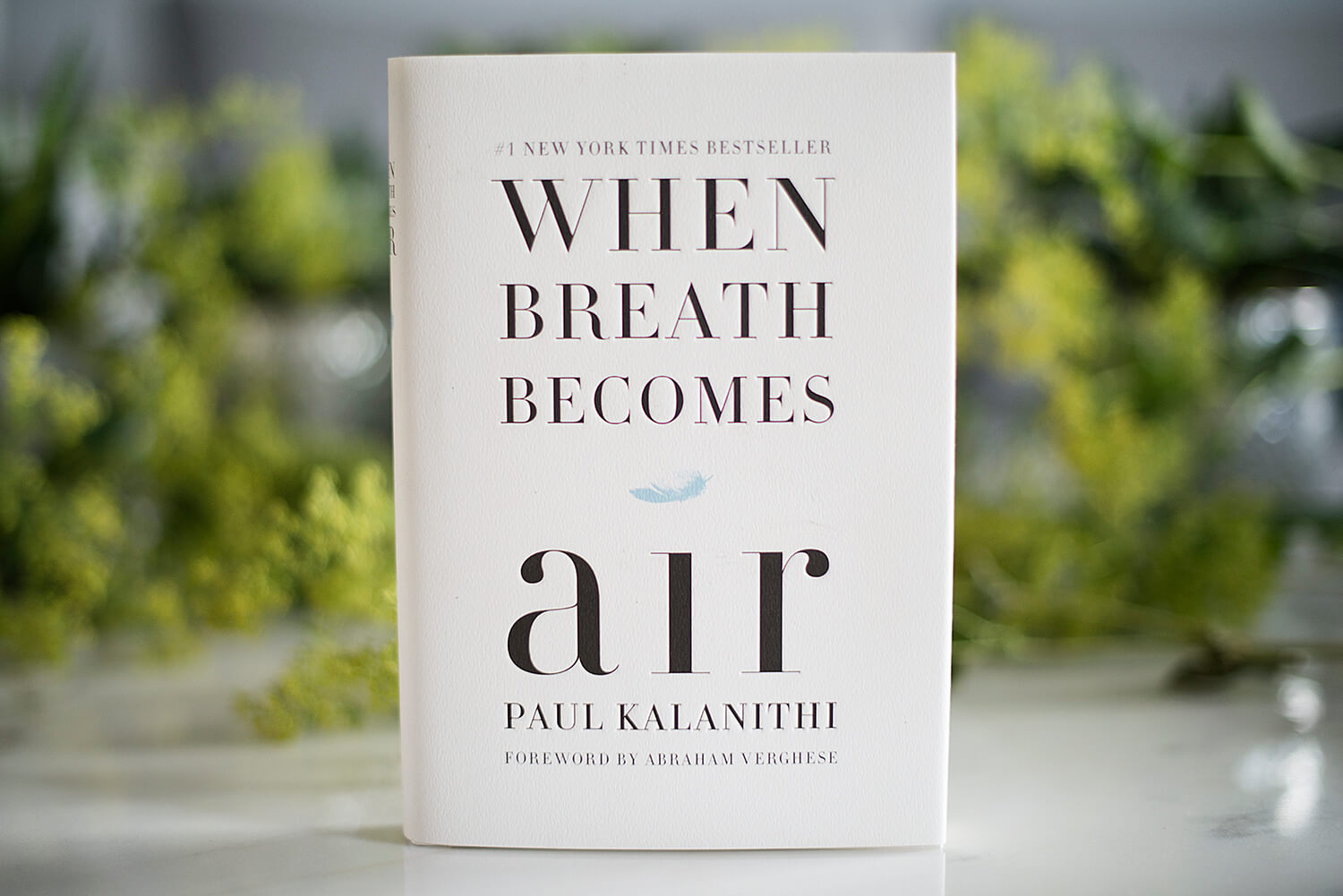
Title: When Breath Becomes Air
Author: Paul Kalanithi
Year of Publication: 2016
Genre: Memoir, Non-fiction
Setting: Primarily in the United States, with a focus on Paul Kalanithi's personal and professional journey
Summary: "When Breath Becomes Air" is a profoundly moving memoir that chronicles the life and reflections of Paul Kalanithi, a neurosurgeon who was diagnosed with terminal lung cancer at the age of 36. The book explores themes of mortality, meaning, and the human experience in the face of a life-limiting illness. Kalanithi reflects on his transition from being a doctor who saves lives to being a patient facing his own mortality. With eloquence and introspection, he shares his experiences, emotions, and philosophical ponderings as he grapples with the fragility of life, the pursuit of purpose, and the inevitability of death.
Major Themes:
- Life and Death: The book delves into profound questions about the meaning of life, the nature of death, and how one finds purpose and fulfillment in the face of mortality.
- Medicine and Identity: Kalanithi reflects on his identity as a neurosurgeon and the challenges he faces when he transitions from being a healer to being a patient.
- Relationships and Legacy: The author explores the impact of his illness on his relationships, particularly with his wife, family, and colleagues, and contemplates the legacy he will leave behind.
Awards: "When Breath Becomes Air" received critical acclaim and was a commercial success. It was a New York Times Bestseller and won several awards, including:
- Goodreads Choice Awards for Best Memoir & Autobiography (2016)
- Wellcome Book Prize for Best Book about Health, Medicine, or Illness (2017)
Legacy: Kalanithi's memoir has resonated with readers worldwide and has been praised for its profound insights into the human condition, the practice of medicine, and the search for meaning in the face of mortality. "When Breath Becomes Air" has sparked discussions about the nature of life, the importance of empathy in healthcare, and the value of embracing our limited time on Earth. The book has left a lasting impact on readers, provoking contemplation and reflection on the fragility and beauty of life.
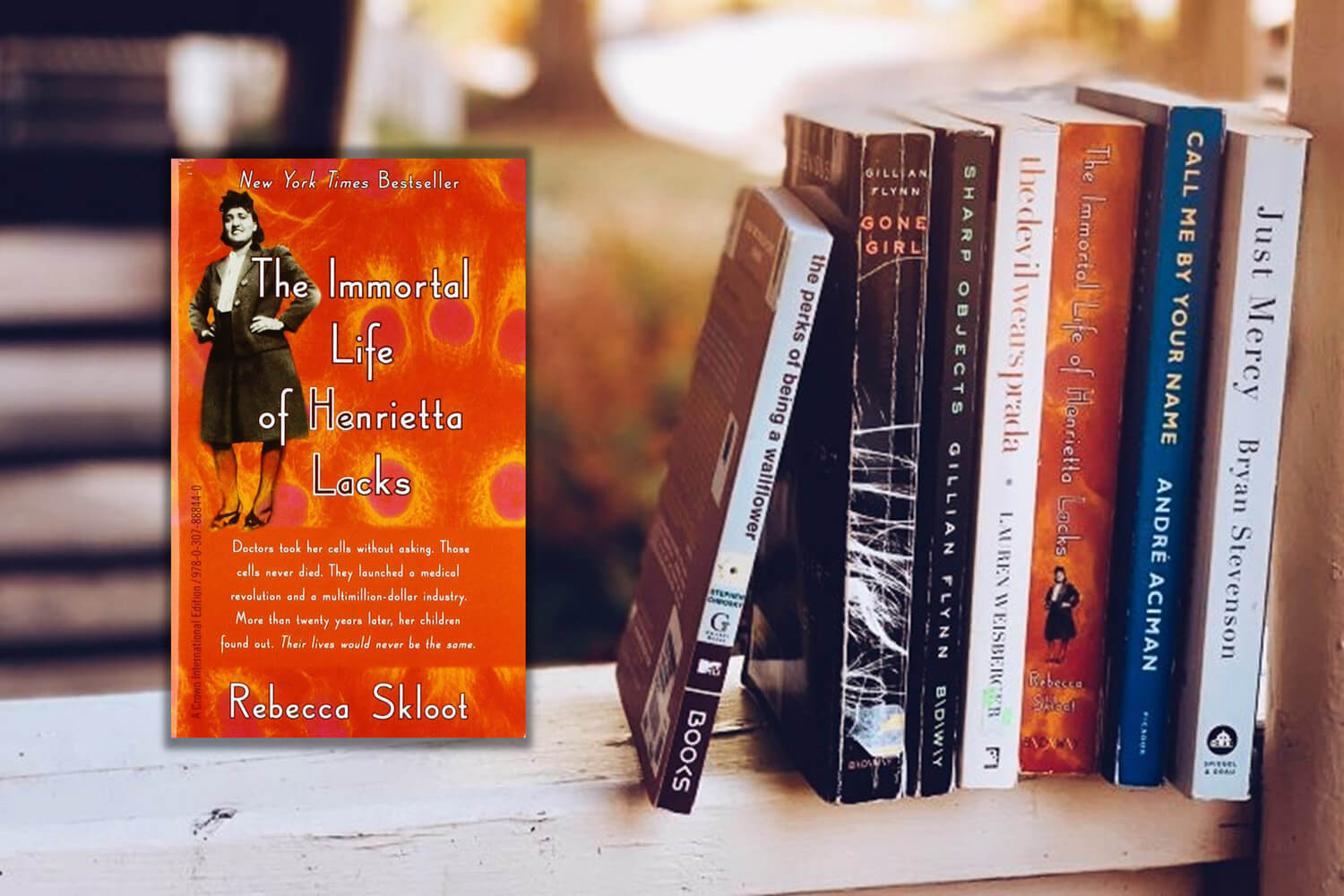
Title: The Immortal Life of Henrietta Lacks
Author: Rebecca Skloot
Year of Publication: 2010
Genre: Non-fiction, Biography, Science
Setting: Primarily in the United States, with a focus on Baltimore, Maryland
Summary: "The Immortal Life of Henrietta Lacks" is a compelling and deeply researched work that tells the story of Henrietta Lacks, a Black woman whose cells were taken without her knowledge or consent and became the foundation for significant medical advancements. The book explores the ethical and scientific implications surrounding Henrietta's cells, known as HeLa cells, which have been instrumental in numerous medical breakthroughs, including the development of the polio vaccine and advancements in cancer research. Skloot not only delves into the scientific impact of the cells but also uncovers the personal story of Henrietta and her family, shedding light on the enduring legacy and ethical questions surrounding tissue research and consent.
Major Themes:
- Medical Ethics: The book examines the ethical implications of taking and using Henrietta Lacks' cells without her consent, raising questions about informed consent, medical research, and the exploitation of marginalized communities.
- Racial Inequality: Skloot addresses racial inequality and the history of medical experimentation on Black individuals, highlighting the broader context in which Henrietta's story takes place.
- Human Connection and Legacy: The book explores the impact of Henrietta's cells on medical research and her family's journey to understand and assert their role in her legacy.
Awards: "The Immortal Life of Henrietta Lacks" received widespread acclaim and several awards, including:
- National Academies Communication Award (2011)
- Wellcome Trust Book Prize (2010)
Legacy: Skloot's book has been highly influential, shedding light on the history of medical research and the exploitation of marginalized communities. It prompted important conversations about medical ethics, consent, and the recognition of contributions from historically underserved communities. "The Immortal Life of Henrietta Lacks" has been praised for its blend of scientific research and personal narrative, making the story accessible and compelling to a wide range of readers. It continues to be widely read and studied, sparking discussions about race, medical ethics, and the intersection of science and social justice.










